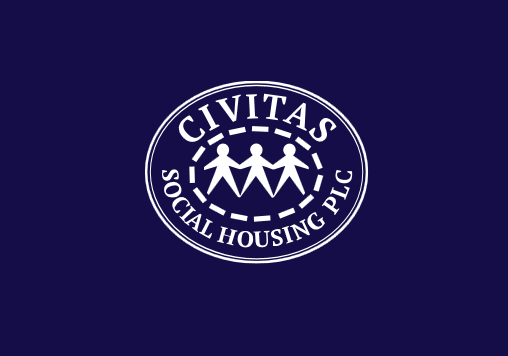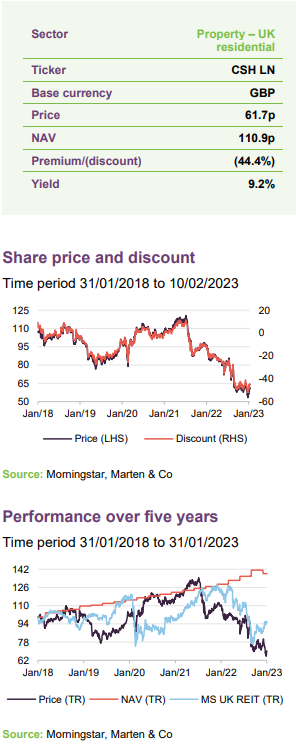Time to buy?
Civitas Social Housing (CSH) has suffered a sustained fall in its share price which sees it now trade on a discount of 44.4%. CSH’s inflation-linked leases (which benefit from annual rental uplifts in line with CPI or CPI+1%) more than compensated for a higher discount rate used to value its portfolio (following market volatility caused by higher interest rates) and resulted in CSH reporting an uplift in NAV in September 2022 – one of the only REITs to do so in the period. Its NAV fell by 3.4% in the quarter to December 2022, which compares favourably with the REIT sector.
The adviser says that the financial strength of its housing association tenants is improving and the social housing market fundamentals remain strong.
Income and capital growth from social housing
CSH aims to provide its shareholders with an attractive level of income, together with the potential for capital growth from investing in a portfolio of social homes. The company expects that these will benefit from inflation-adjusted long-term leases and that they will deliver a targeted dividend yield of 5% per annum on the issue price, with further growth expected. CSH intends to increase the dividend broadly in line with inflation.
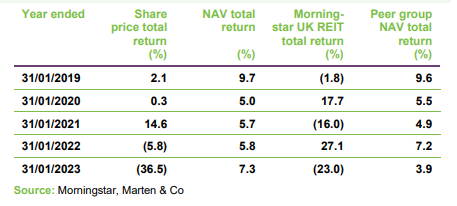
Fund profile
CSH has invested £835m to amass a portfolio of diversified supported social housing assets since it launched on 18 November 2016. It raised £350m at IPO and expanded in November 2017, raising an additional £302m through a C share issue (whereby C share investors own a separate class of shares which has its own portfolio). These two pools were merged together in December 2018.
CSH aims to provide an attractive yield, with stable income growing in line with inflation and the potential for capital growth. Its diversified portfolio is let to housing associations and local authorities (referred to as “registered providers”) on long-term lease agreements (typically 25 years). It buys only completed homes, which includes acquiring new developments on completion, but it does not get involved with forward funding deals (putting up money to finance the construction of new social homes), or the management of social homes directly.
The adviser feels that CSH’s portfolio has a low correlation to the general residential and commercial real estate sectors, as the supply and demand demographics driving the social home sector do not move in line with that of the wider real estate market. It is a real estate investment trust (REIT), giving it certain tax advantages. As a REIT, it must distribute at least 90% of its income profits for each accounting period.
Hear about the fund
The adviser – Civitas Investment Management
CSH is advised by Civitas Investment Management (CIM), previously named Civitas Housing Advisors, a business established in 2016. Many of the 40-strong team have long experience of working in the sector and in specialist healthcare, and collectively, they have been involved in the acquisition, sale and management of more than 80,000 social homes in the UK.
Hear about the adviser
Share price under pressure
CSH’s share price has been on a downward trajectory since a short seller attack in September 2021. You can read a detailed analysis of the short seller’s allegations and CSH’s rebuttal in our last annual overview note on CSH here. To recap, almost all the points made by the short seller were proved to be unfounded, the adviser says. The only point that was irrefutable was the lack of disclosure of interests in a small number of ‘Opco-Propco’ investment deals. Despite the rebuttal of the allegations, CSH’s share price never recovered and fell further throughout 2022 as the cost of its debt increased (which is likely to drag on its earnings – more details on the group’s debt is detailed on page 20) and a regulatory notice was served on one of its tenants. The group’s share price fell to its lowest-ever level in January and is now trading on a discount to NAV of 44% (at 10 February 2023).
However, from an operational viewpoint the business is in a strong position, the adviser says, and the demand and supply fundamentals underpinning growth in the sector are as compelling as ever.
Market outlook – fundamentals strong
The demand and supply characteristics in the specialist supported housing (SSH) sector, in which CSH is the leading UK investor, remain strong, the adviser states. There is a severe shortage of properties that are capable of hosting mid-to-higher-acuity care within local community settings, while demand for such properties is high due to the long-standing government policy of seeking closure of remote hospitals in favour of community provision. Specialist supported housing enables individuals with significant long-term care needs to live fulfilling lives within the community and close to their families, rather than in a hospital or institutional setting.
The trend for community provision has become established in the UK over the past 25 years and reflects much broader societal change in the manner in which care is delivered for people of working age with lifelong care needs, which mainly include people with learning disabilities, autism, mental health issues and physical disabilities. Demand for supported housing is also growing and expanding to cover a wide range of underlying needs faced by people who are battling homelessness, addiction or who are stepping down from the NHS into a more appropriate supportive care environment.
What has developed more recently has been the emergence of specialist housing associations that deliver the augmented property services and who, in turn, enter into leases to secure available properties for their underlying tenants.
Local authorities are responsible for providing accommodation and funding care for individuals within their jurisdiction. Supported living provides local authorities with a cost-effective solution to housing people in need, with rents being cheaper than residential care placements and inpatient facilities, the adviser says. According to the monetisation calculations completed by the Social Profit Calculator in 2021, CSH’s portfolio generated £75.9m of direct fiscal savings to local and national government per year. The setting has also been found to increase quality of life and life outcomes for the residents.
The government has reinforced its commitment to community care and housing and aims to free up 13,500 NHS beds, promising an initial £500m to support the discharge of patients from hospital into the community.
The Care Policy and Evaluation Centre has predicted 21.2% growth in the demand for SSH housing in England between 2023 and 2038 and 39.1% in respect of learning disability alone, as shown in Figure 1.

On the supply side, Mencap states that a significant undersupply of SSH has resulted in a substantial number of people with long-term care needs living with elderly parents and over 2,000 people with a learning disability being placed in inpatient units, miles away from their families.
How it works
Housing benefit typically provides 100% of the funding of rent and service charge for all supported housing, as shown in Figure 2.

Local authorities enter into care contracts with care providers, who are responsible for the personal care of each individual tenant and pay them from funding provided by the Department for Work and Pensions.
The care provider in turn enters into a service level agreement with a registered provider, usually a housing association, which has ultimate responsibility for housing provision. Housing benefit is paid by the local authority to the registered provider to cover each individual tenant’s rent and service charge.
CSH owns the property and rents it under a long-term lease, or an occupancy agreement, to the registered provider. The registered provider uses the housing benefit that it receives to cover the rent due and the costs of managing and maintaining the property, as well as seeking to generate a modest surplus.
At the end of November 2022, 10 of the registered providers in CSH’s portfolio to have reported year-end financial results for 2021/2022 were in surplus, with the combined surplus of the 10 companies up 55% on the previous year. This reflects the improvement in the financial and operating performance of housing associations in the sector, the adviser says. Despite the pace of improvements varying across the sector and continued issues at some smaller housing associations (see page 13 for information on the regulatory notice served on one of CSH’s smaller tenants in December 2022), the level of standards and performance is improving, the adviser states.
The lease-based model in the supported housing sector has come in for criticism in some quarters, but it has government support. The Department for Work and Pensions noted in a report published in May 2022 that “when operated with considerations to good governance and financial viability without taking advantage of the housing benefit scheme, these models can be a legitimate and positive method of providing supported housing”.
Inflation
CSH’s rent roll increased by 6.0% to £55.0m in the year to 30 September 2022 thanks to its inflation-linked leases. Annual rental uplifts come into effect on the anniversary of the lease being signed and are calculated using historical CPI data (with the CPI rate usually backdated two months to ensure availability of data). Therefore, the adviser expects the rent roll to continue to benefit from high indexation over the remainder of this year, with CPI at 10.5% in December. Across CSH’s portfolio, 24% of rents benefit from indexation at CPI+1%, with the balance of 76% at CPI. Additionally, 31% of rental uplifts are subject to a cap of 4%.
CSH’s housing association tenants seek sign-off for the new rental level from the relevant housing benefit officers within each local authority in which they operate. At a time of double-digit inflation (which the adviser expects to decline significantly throughout 2023) CSH engages with its housing association tenants to ensure that they have the requisite information to support claims to the local authority for rental indexation. CSH will offer an element of flexibility to maintain strong and positive relationships with housing associations and with local authorities to provide long-term value for money. Given the current level of CPI inflation, the adviser says that the current trend line in the company’s rental growth is not expected to change.
The adviser says that rental levels across its portfolio are regularly tested for affordability and agreed with housing associations. It adds that rent levels vary significantly, as they do in the general housing sector, depending on their location, as well as their use (properties that deliver high-acuity care will be more expensive than mid-acuity due to the extra cost of adapting the property), but usually make up a small part (10% – 15%) of the overall cost of the delivery of high-acuity care provision.

CSH has previously indicated that the average weekly rent for a mid-acuity property in its portfolio is £194 (which is in line with rents quoted by Mencap) and £311 a week for very high-acuity residential care accommodation. In both cases, this represents a significantly lower cost than other forms of accommodation such as institutional or hospital care. CSH’s small portfolio of properties for refugees have an average weekly rent of £50 (which is not claimed as exempt rent), due to the lower level of adaptation needed to deliver the care required.
Impact of interest rate rises
Social housing has not followed the pattern of downward pressure on values following the volatility in the financial markets in the second half of 2022. CSH’s portfolio increased in value by 3.2% in the six months to 30 September 2022 despite an uplift in the discount rate used to value its portfolio (details of how CSH’s portfolio is valued can be found on page 17). The increase in value was principally due to its index-linked leases. In contrast, values in the commercial real estate sector were heavily downgraded in the second half of 2022 and continue to fall.
Where CSH has been impacted by interest rate rises is on the cost of its debt (a detailed look at CSH’s debt profile is on page 20). Just over 60% of its debt was at a variable rate of interest (set with reference to SONIA), but the adviser has entered into interest rate caps or swaps on all of its variable rate debt meaning that its debt is now 100% fixed or hedged. It has also agreed a new £70.875m senior secured guaranteed note with an institutional investor, which comes with a 5.69% fixed coupon. All this combined will see CSH’s weighted average cost of debt increase to 3.9% (from 3.0% at 30 September 2022 and 2.5% at 31 March 2022). This is likely to have a drag on earnings, but the adviser says that it should not impact its target dividend level for the financial year ending 31 March 2023 of 5.7p per share.
Social impact
Investment in supported living has an obvious positive social impact. Investments are designed with the intention of enhancing the lives of people who, as a result of the homes, are able to benefit from the availability of secure, long-term, high-quality housing, whether of a general nature or as a base for the provision of more specialist housing and care.
Every year, social advisory firm The Good Economy publishes a report examining the social impact of CSH’s investments. The 2022 report has yet to be published, but the 2021 report found CSH to be an “authentic impact investor” in accordance with the International Finance Corporation Principles for Impact Management. As part of the report, the Social Profit Calculator (SPC) – a social value consultancy that specialises in calculating the additional value of social, economic, and environmental impact – calculated the social value of CSH’s portfolio in monetary terms and found the portfolio to have produced £127m of social value per year (this improves on the £114m calculated in 2019 – it did not release a report in 2020 due to COVID). This total social value figure was split between £51.2m of social impact (this is the value of the improved personal outcomes for residents) and £75.9m of fiscal savings generated for public budgets through the reduced cost of care packages. The total figure equates to £3.51 of social value being created for every £1 of annualised investment.
Investment process
CSH has invested £835m to build a portfolio of 697 properties, as at 30 September 2022. The company’s investment portfolio offers dual exposure to both the social housing and healthcare sectors in the UK. It provides purpose-built and bespoke properties that support the delivery of mid-to-higher-acuity care for working-age adults with long-term care needs. It delivers this in local community settings supported by government-funded care providers and housing associations.
The bulk of the properties have been acquired from housing associations, care providers, developers and private owners, at yields of between 5.5% and 6.5%; mainly on an off-market basis. As the first and largest fund in the sector, CSH has established extensive relationships with developers, care providers and registered providers, which it uses to put in place acquisition agreements. All of the properties that it acquires already have a lease agreement with a registered provider in place, and so are income-producing from day one. It may, from time to time, require the seller to review and upgrade the contracts that it has with various parties before acquisition.
In May 2020, CSH received overwhelming approval from shareholders to expand its investment policy to allow transactions to be undertaken directly with other not-for-profit organisations, including the NHS as well as other entities in receipt of government funding.
CSH makes a detailed assessment of each property to ensure before acquisition that it is fit for purpose. It only invests in completed buildings and does not engage in development or forward funding risk.
Due diligence
CSH has followed a detailed due diligence programme with its lease counterparties since launch, which encompasses:
- completion of diligence forms for KPIs, health and safety and finances;
- discussions with the chief executive and finance director of the registered provider;
- site visits to meet management and visit properties;
- standard investigation reports on key individuals for standards of conduct;
- regulatory checks;
- review of available management accounts and business plans;
- physical inspections of properties;
- independent, third-party benchmarking of rent;
- references from all significant care providers; and
- requests for ring-fencing, with segregated accounts or charges for protection of rent and deposits due to CSH.
Promoting best practice
CSH works closely with housing associations to support them and help recruit experienced and knowledgeable non-executive directors onto boards in order to strengthen corporate governance and improve standards of disclosure and asset management.
It has taken its responsibility as the leading player in supported living further with the formation of a not-for-profit community interest company (CIC). The Social Housing Family CIC’s aim is to offer additional support, guidance and management skills to its member housing associations.
The CIC is operationally and financially independent from CSH, is supported by financial contributions from within the social housing sector and has a skills commitment from CSH.
Members of the CIC transfer ownership of the housing association to the social housing family, thereby giving CSH enhanced certainty of future rental income as well as further protecting the interests of end users.
Auckland Home Solutions and Qualitas Housing were the first two housing associations to join The Social Housing Family CIC, and recruitment of additional senior personnel for both companies has provided further resources and expertise.
CSH has also developed a best-practice protocol to ensure that housing associations are structured for long-term stability.
The protocol contains 10 core principles relating to matters such as financial prudence, conflicts of interest, management and interaction with regulators. In addition, it contains detailed requirements for the on-boarding of new properties. These include:
- independent verification of rent to confirm this is appropriate within the local authority area and represents value for money;
- a minimum ‘on-boarding fee’ paid to the Registered Provider from the proceeds of the sale of the property to CSH, to cover the setup costs of getting the property ready for occupation by a tenant;
- the Registered Provider maintaining segregated accounts/charges for rent and service charges for properties leased from CSH;
- the establishment of a rental protection fund for each tenant, to cover three-to-six months’ rent on every property;
- a sinking fund for each property to cover certain capital and maintenance costs and over-runs; and
- an indexation reserve fund to be set up at the outset of a lease and topped up over its lifetime, with indexation being set with reference to CPI.
Investment restrictions
CSH operates within the following investment restrictions:
- It may only invest in social homes located in the UK.
- It may only invest in social homes where the counterparty to the lease is an approved provider.
- The minimum unexpired term for a lease or occupancy agreement at the time of acquisition will be 10 years (although leases with shorter lengths can be included in an acquisition of a portfolio that has a weighted average unexpired lease term (WAULT) of more than 15 years).
- The maximum exposure to any single approved provider is 25% of gross asset value (once the capital of the group is fully invested).
- The maximum exposure to a group of houses/apartment blocks in a single geographic location is 20% of gross asset value (once the capital of the group is fully invested).
- Only completed social homes will be acquired – forward finance of social homes under construction is not permitted.
- No investment in other investment companies or alternate finance funds.
- No short selling.
Asset allocation
CSH’s portfolio was valued at £999.5m at 30 September 2022 and comprises 697 properties, let to 18 housing associations, with 4,594 individual tenants. The valuation was conducted on the basis of the Bank of England’s long-term inflation target for CPI of 2% per annum. The weighted average unexpired lease term (WAULT) on the portfolio is more than 21.9 years.
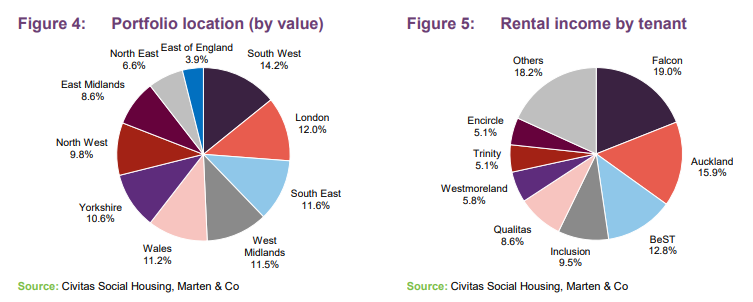

Investment activity
CSH’s investment activity has been limited since the short seller attack in September 2021 hit its share price and scuppered its plans to raise equity to grow. It bought just one small property, which houses two people, in the six months to 30 September 2022. The adviser says that it has an expansive investment pipeline but that until the share price recovers it cannot grow meaningfully. This means that potentially thousands of people in need of the specialist social housing that CSH invests in – many of whom have high-acuity care needs – are stuck in care homes and NHS beds and costing the UK taxpayer far more than they would if they were in specialist supported accommodation, the adviser says.
Regulatory notice on My Space
In January 2023, the Regulator of Social Housing (RSH) issued an enforcement notice on My Space (a small tenant in CSH’s portfolio that represents 1.3% of the rent roll, relating to nine properties) requiring it to undertake a number of actions including the strengthening of its board, reporting on solvency and developing action plans with regards to compliance with the rent standard.
The adviser says that rent arrears have recently occurred which are not material but are being followed up. It added that it was considering whether it was appropriate to reassign the leases on the nine properties to another housing association.
New lease clause in bid to achieve regulatory compliance
In an effort to address repeated concerns raised by the regulator in regards to the lease-based social housing model – namely the financial weakness of the housing association tenants and the mismatch of long-term lease liabilities and short-term income streams – CSH added a new clause to leases that enables greater risk-sharing with the housing associations. The clause allows a housing association to temporarily stop paying rent in certain circumstances, such as if it had not received housing benefit from a local authority. This would apply after an initial period of time, and then only if paying the rent in full would cause the housing association to fail to meet the regulator’s standards. CSH would receive rent arrears as and when the housing benefit is subsequently received by the housing association. Under the terms of the clause, the housing association would provide CSH with full data and step-in rights.
CSH’s adviser says that it anticipates that the clause will only be relevant to a small number of properties at any one time, and will not have any material impact on the company’s rent roll.
The adviser hopes that the move will enable the housing associations to be in a better position to achieve regulatory compliance with the RSH’s Governance and Financial Viability Standard and lift the long-standing cloud of regulatory uncertainty over its share price. Judgments passed by the regulator on CSH’s tenants are usually followed by a drop in CSH’s share price, as has been the case with My Space.
CSH intends to initially incorporate the clause into a limited number of existing leases on unencumbered properties. It has so far agreed to incorporate it into leases with two of its housing associations tenants. The adviser says it has formal written confirmation from valuers that the inclusion of the clause within new and existing leases will not impact on the value of the leases or assets. The adviser believes that the enhanced regulatory alignment would, in fact, result in asset value appreciation over the medium term.
Further enhancing ESG credentials
As mentioned earlier, there is an obvious positive social impact to investing in supported social housing. CSH is also increasing the environmental credentials of its portfolio through a partnership with energy provider E.ON. The environmental enhancements aim to reduce the carbon footprint across its portfolio, leading to lower energy costs for residents and a more carbon neutral portfolio. The initiative also forms part of CSH’s objective to reach carbon neutrality. Measures include the installation of cavity wall insulation, loft insulation, external wall insulation, air source heat pumps and solar PV and battery storage to identified properties.
The initial phase of the E.ON programme saw 101 properties surveyed and 43 provided with solar and battery storage, 20 with loft insulation and 14 with cavity wall insulation. It resulted in the portfolio’s carbon footprint reducing by 5% per tenancy (from 2.70 tonnes of CO2/tenancy in September 2021 to 2.56 tonnes of CO2/tenancy).
A second phase commenced in November 2022, which is focused on 60 properties with the target of reducing carbon emissions at these properties by 25%. The project will be part-funded by government grants, including the ECO4 funding scheme, part of the government’s programme to make homes in the UK more energy-efficient, the Social Housing Decarbonisation Fund, and other grants.
The company plans to expand the environmental-enhancing schemes across its portfolio in further phases over a number of years. As well as having the obvious environmental benefits, improving the energy efficiency of homes should also provide a small incremental increase to the value of the portfolio, the adviser believes.
Performance

Figure 7 illustrates the convergence in performance of CSH’s NAV and share price over the past five years. Having performed strongly during the pandemic, CSH’s share price total return had caught up with NAV total return by June 2021. However, the group’s share price fell sharply from August 2021 firstly as a regulatory judgement on one of its tenants was published, then secondly it was targeted by the activist short-seller. This coincided with the company dropping out of the FTSE 250 index, which saw index trackers sell out of their position in the fund. This saw it fall below the Morningstar UK REIT index and the share price has yet to recover. Its NAV has trended upwards since its launch, with strong gains over the last year, and over five years the NAV total return is 37.4%.
Peer group comparison
CSH sits within a small group of listed peers comprising Triple Point Social Housing REIT (SOHO), Residential Secure Income REIT (RESI) and Home REIT (HOME).
RESI’s focus is more on retirement properties and shared ownership housing (without leases), while HOME launched in October 2020 and is solely focused on providing homeless accommodation. Therefore, SOHO may provide a better direct comparison.
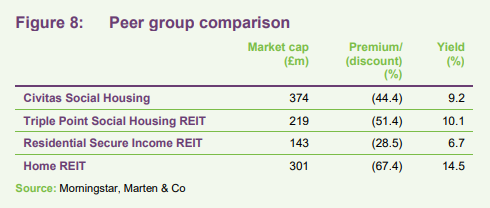
CSH is larger and has a longer track record than SOHO, slightly better performance over all periods in NAV total return terms, and comparable dividend yield. Currently, trading in HOME’s shares is suspended after it failed to meet the statutory four-month deadline to file results, having had to undergo an enhanced audit following allegations made in a short seller attack. The allegations, made in November 2022, centre on the quality and suitability of HOME’s properties for vulnerable people and the strength of its charity tenants. Despite refuting the allegations, HOME’s share price has tanked, losing almost 70% in value in 2022.
The adviser says that investors should be comforted by the leading role that CSH and its adviser takes in the social housing sector, the quality of its portfolio, which delivers mid- and high-acuity care with the average number of care hours provided in a typical CSH property of 50 hours per week, and the robust regulation of the sector (which is not the same as with homeless accommodation).

Valuation methodology
The valuation methodology used by CSH’s valuers, JLL, follows the income approach, which considers the rental income currently payable, the next uplift for that income under review, the likelihood of a continuation of that rental income – with growth in accordance with the leases – over the remaining terms, and then a long-term reversion which considers the likely ability of the properties to continue to generate rent through supported housing occupation, as distinct from a reversion to vacant possession value.
The material inputs that determine the value of CSH’s portfolio are as follows:
- The rate of 2% per annum has been used for CPI over the term of the leases (in line with the Bank of England’s long-term inflation targets for CPI). It should be noted that all leases benefit from either CPI or CPI+1% indexation.
- The discount rate applied to the rental flows.
To determine the discount rates applied, the valuer will assess social housing demand for each property, costs of acquisition and refurbishment of each property, the anticipated future underlying cash flows for each property, benchmarking of each underlying rent for each property, and whether the property has the benefit of full repairing and insuring leases (all of CSH’s leases do). Additionally, the greater the length of the lease, then (all other metrics being equal) the greater the value of the property.
Average discount rate and range
The average discount rate used by the valuer across CSH’s portfolio was 6.0% at 30 September 2022 (31 March 2022: 5.5%, September 2021: 6.0%). The valuer took the view that the immediate volatility in the financial markets following the mini-budget announcement had not translated into any evidential movement in yields in the social housing sector, which is generally underpinned by long, index-linked leases. There was some variation across the portfolio due to individual property factors.
The range of discount rates used by the valuer was from 4.6% to 11.4%. In assessing the range of discounts, the valuer considers the likely net initial yield that would be sought by the investment market and builds in additional discounts to reflect added risk into the discount rate of the term and, in some cases, the discount rate for the reversion. For example, where larger rental growth is allowed during the lease, an additional discount is built into the reversion because of the greater risk of a fall in the rent at the end of the lease.
Dividend
CSH is targeting a dividend for the financial year ending 31 March 2023 of 5.7p per share, continuing its upward progression since it launched five years ago (as shown in Figure 10). This is a 2.7% increase on the 5.55p it paid in the previous year.
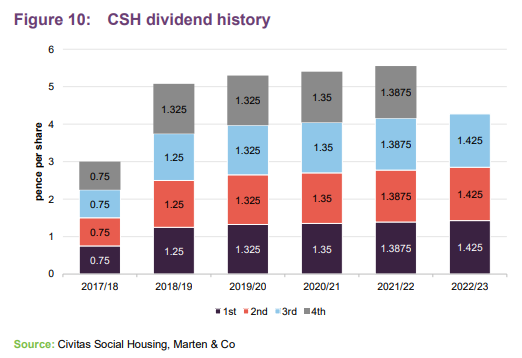
Premium/(discount)
CSH’s shares initially traded at a premium to its NAV, but moved to trade at a discount due to the concerns that the regulator highlighted regarding some of the housing associations in its portfolio. As the company demonstrated the underlying fundamentals supporting growth in the supported living sector and its leading position in it, the discount narrowed from July 2019. It moved to a healthy premium during the pandemic as its government-backed income proved resilient. Following the events mentioned earlier, the rating moved from a peak of around a 10% premium in August 2021 to a significant discount. At 10 February 2023 it was trading at a discount of 44.4%.
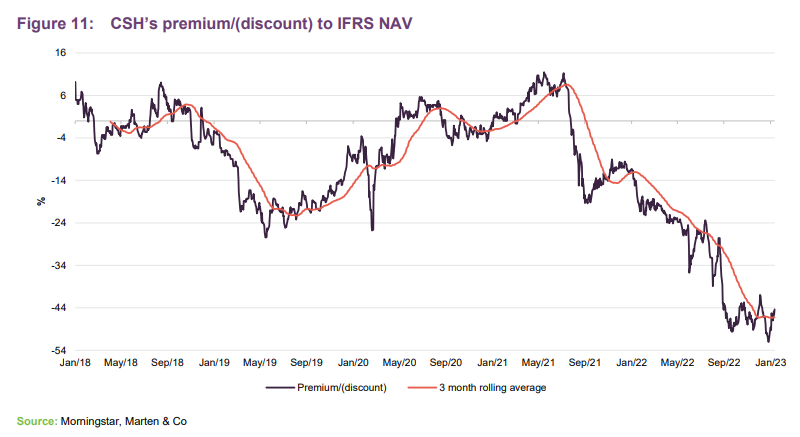
CSH is authorised to repurchase up to 14.99% of the issued share capital (renewal of this authority is sought annually at the company’s AGM). Any shares repurchased may be cancelled or held in treasury and later resold. Shares will not be resold from treasury at a discount to NAV unless as part of an offer that is being made to all shareholders on a pro-rata basis.
During September 2022, CSH repurchased 4.35m shares to be held in treasury at an average price of 72.65p per share and a cost of just over £3.1m. It has now repurchased 16.075m shares to be held in treasury since 20 September 2021 at an average price of 86.53p per share and a cost of just over £13.8m. This represents 2.58% of the issued share capital. The share purchases were made with a view to reducing discount volatility and are accretive for shareholders.
Fees and costs
CIM is entitled to an annual advisory fee based on a percentage of CSH’s IFRS NAV. This is calculated as 1% on the first £250m, 0.9% on the next £250m, 0.8% on the next £500m and 0.7% on amounts above £1bn. The fee is calculated and paid quarterly in advance. There is no performance fee.
CIM’s contract cannot be terminated before 30 May 2024, and thereafter 12 months’ written notice is required.
Capital structure and life
As at 10 February 2023, CSH had 606,386,380 ordinary shares in issue, with 16,075,000 shares held in treasury.
Debt facilities
Gearing may be used up to an absolute maximum of 40% of gross asset value (i.e. net gearing of 66.7%). Debt has to be secured at an asset level (a property or collection of properties held within a special purpose vehicle) without recourse to CSH. The board has stated that it intends that CSH should have an average leverage of 35% on a gross asset basis. At 30 September 2022, CSH had total bank borrowings of £357.0m, as detailed in Figure 12, equating to 33.7% of gross assets.
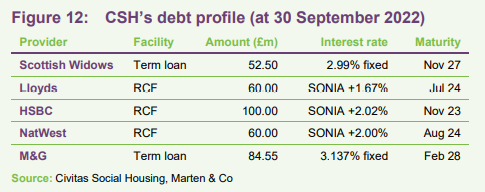
Since September 2022, the adviser has made several changes to the group’s debt structure and facilities, reflected in Figure 13.
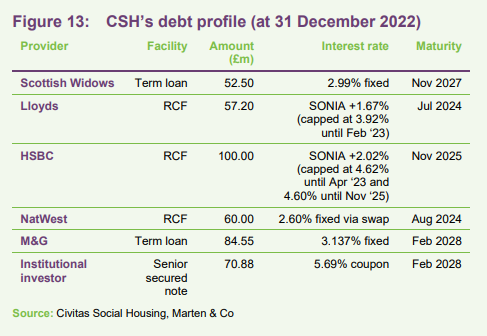
On 1 December 2022, it agreed a £70.875m senior secured guaranteed note with an institutional investor. The facility comes with a 5.69% fixed coupon and is due in February 2028. The transaction is expected to close in mid-February 2023, subject to certain conditions. The company intends to utilise the facility to redeem the existing Lloyds Bank loan, as well as providing additional liquidity.
The adviser has also agreed interest rate caps or swaps on all of its variable rate debt (set with reference to SONIA). On the £100m loan provided by HSBC, the group extended the facility until November 2025 and entered into interest rate cap transactions that will mean the interest rate will not exceed 4.62% from 21 September 2022 to 17 April 2023 and 4.60% from 18 April 2023 to 28 November 2025. The cap was at a one-off cost of £8.1m.
The adviser has reduced the outstanding amount on the Lloyds facility to £57.2m and put an interest rate cap in place on the facility, capping the interest rate at 3.92% until February 2023.
An interest rate swap has also been entered into with NatWest to mitigate the risk of changes in interest rates. The swap has a notional value of £60m and fixes interest at 2.60%.
CSH’s weighted average cost of debt will increase to 3.9% following the implementation of the new arrangements (from 3.0% at 30 September 22). The weighted average length of debt will increase slightly from the 3.53 years reported at 30 September 2022.
Life
CSH’s year end is 31 March. CSH held its first continuation vote at the AGM in 2022, which was overwhelmingly supported, and will be held every five years thereafter.
Major shareholders
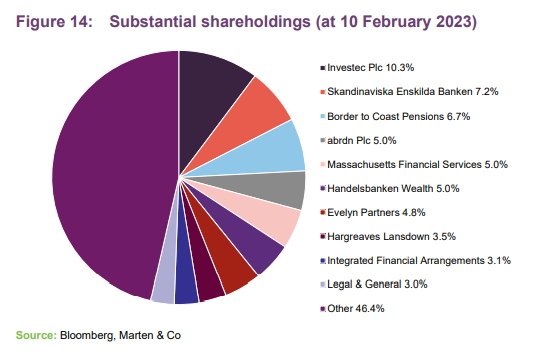
The investment team
CSH’s investment advisor, CIM, has a proven track record in the social housing sector, combined with many years of experience in the investment industry and financial sector.
Paul Bridge
Paul is CIM’s chief executive (social housing) and joined the company at formation. He has over 20 years’ experience of working at a senior level in the social housing sector. Paul was chief executive of Homes for Haringey, a registered provider, where he was responsible for 800 staff and 21,000 homes. He has also held a variety of non-executive roles including chairman of Thames Valley Charitable Housing Association and director at Hyde Group.
Andrew Dawber
Andrew is a director and co-founder of CIM. He has been active in the social housing sector since 2012 and was part of the team that founded the private investment company Funding Affordable Homes. Andrew also founded PFI Infrastructure, the first publicly-traded social infrastructure fund.
Tom Pridmore
Tom is group director and co-founder of CIM. He is a specialist in real estate and residential development finance and was part of the team that founded the private investment company, Funding Affordable Homes. Tom is a qualified lawyer with over 19 years’ experience in real estate investment and development, and is responsible for sanctioning all property investment advice and portfolio monitoring.
Claire Fahey
Claire is group finance director at CIM. She has 11 years’ experience across real estate and development sectors. Prior to joining CIM Claire was responsible for the financial control function of group companies owned by Inland Homes Plc, leading on financial reporting, audit, group forecasts and performance management. Prior to that, she was fund finance manager at Savills Investment Management.
Eleanor Corey
Eleanor is transactions director at CIM. She has extensive experience in all aspects of real estate management, investment, development and finance from stints at the in-house corporate real estate team at Lloyds Banking Group and a national housebuilder. Eleanor previously spent more than 12 years at international law firm CMS Cameron McKenna Nabarro Olswang, where she practised in their real estate team.
Mary Finnigan
Mary is transactions director at CIM. She has worked in the real estate sector for over 20 years. Prior to Civitas, Mary was the head of transactions for WeWork where she led the real estate transaction team in the acquisition and asset management of over 150 buildings in 30 cities in EMEA, including numerous pre-lets in London, Paris and Berlin. During her five years at WeWork, she gained extensive experience in the regulatory and legal complexities of the key European markets. Mary is a qualified real estate lawyer and began her career at Jones Day Gouldens before moving to SJ Berwin, where she advised major developers, landlords and tenants including The Crown Estate, Axa, British Land, SuperDry and Marks & Spencer. Mary is an active member of Women Talk Real Estate, Real Estate Women and Women on Boards.
Board
The board is comprised of five non-executive directors, four of whom were appointed on the company’s incorporation in November 2016. All members are non-executive and independent of the investment adviser.
All directors automatically stand for election at the first AGM following their appointment. Thereafter, they are required to stand for re-election at three-yearly intervals, unless they have served for nine or more years, after which they stand for re-election annually. Excluding newly-appointed directors and directors who have served more than nine years, one-third of the remaining directors must retire and stand for re-election by rotation at each AGM.

Michael Wrobel
Michael has over 30 years’ experience in the investment industry. He is the non-executive chairman of Diverse Income Trust. He serves as a trustee director of the BAT UK Pension Fund and chair of its investment and funding committee. Michael is also the chairman of trustees of the Thornton’s Pensions Scheme and Deutsche Bank UK Pension Schemes, a trustee of the Cooper Gay (Holdings) Ltd Retirement Benefits Scheme and acts as an investment adviser to a number of Rio Tinto pension schemes. Formerly, he was a non-executive director of JPMorgan European Smaller Companies Trust and NatWest Smaller Companies. He has served as a director of the Association of Investment Companies, the Investment Management Association and CoFunds. Michael has previously worked at Morgan Grenfell, Fidelity International, Gartmore Investment Management and F&C Management. He has an MA in Economics from Cambridge University.
Caroline Gulliver
Caroline is a chartered accountant with over 25 years’ experience at Ernst & Young, latterly as an executive director. During that time, she specialised in the asset management sector and developed extensive experience of investment trusts. She was a member of various technical committees of the Association of Investment Companies and a member of the AIC SORP working party for the revision to the 2009 investment trust SORP (which set out how investment companies should lay out their accounts). Caroline is a non-executive director and audit committee chair for JP Morgan Global Emerging Markets Income Trust, International Biotechnology Trust and Aberdeen Standard European Logistics Income.
Peter Baxter
Peter has 30 years’ experience in the investment management industry. He is a managing director of Project Snowball, a social impact investment organisation, and a trustee of Trust for London, a charitable foundation. Peter is also a non-executive director of BlackRock Greater European Investment Trust. Previously he served as chief executive of Old Mutual Asset Managers (UK), and has worked for Schroders and Hill Samuel in a variety of investment roles. Peter holds an MBA from London Business School and is an associate of the Society of Investment Professionals.
Alastair Moss
Alastair is a property development lawyer with over 20 years’ experience and is co-head of real estate at Memery Crystal. He has been a non-executive director of Notting Hill Housing Group (now Notting Hill Genesis) and a member of the audit and treasury committees. Alastair is a former chairman of the investment committee of the City of London Corporation and chaired its property investment board. He is currently chairman of the City’s planning and transportation committee. He is a trustee of Marshall’s Charity and a mentor to commercial directors in government departments, has also been a board member of Soho Housing Association, and was a member of the area board of CityWest Homes. Alastair was a councillor at Westminster City Council for 12 years, including his tenure as chairman of the planning & city development committee.
Alison Hadden
Alison has over 25 years’ experience in the housing industry. She started her career at Dudley Metropolitan Borough Council and Birmingham City Council, and went on to hold chief executive positions at several major housing associations, including Paradigm Housing, a 13,000-home housing association based in Buckinghamshire. She has also been an executive director at Circle Housing, one of the largest housing associations in the UK. In these roles, she has worked with many of the stakeholders in the industry, including the Regulator of Social Housing. Alison was previously the chair of Housing Plus Group and is currently a non-executive director and member of the audit and risk committee of Yorkshire Housing and a non-executive director and member of the governance committee of Peaks and Plains Housing.
Previous publications
QuotedData has published eight previous notes on CSH. You can read them by clicking the links below.
Figure 16: QuotedData’s previously published notes on CSH
Source: Marten & Co |
Legal
Marten & Co (which is authorised and regulated by the Financial Conduct Authority) was paid to produce this note on Civitas Social Housing Plc.
This note is for information purposes only and is not intended to encourage the reader to deal in the security or securities mentioned within it.
Marten & Co is not authorised to give advice to retail clients. The research does not have regard to the specific investment objectives financial situation and needs of any specific person who may receive it.
The analysts who prepared this note are not constrained from dealing ahead of it, but in practice, and in accordance with our internal code of good conduct, will refrain from doing so for the period from which they first obtained the information necessary to prepare the note until one month after the note’s publication. Nevertheless, they may have an interest in any of the securities mentioned within this note.
This note has been compiled from publicly available information. This note is not directed at any person in any jurisdiction where (by reason of that person’s nationality, residence or otherwise) the publication or availability of this note is prohibited.
Accuracy of Content: Whilst Marten & Co uses reasonable efforts to obtain information from sources which we believe to be reliable and to ensure that the information in this note is up to date and accurate, we make no representation or warranty that the information contained in this note is accurate, reliable or complete. The information contained in this note is provided by Marten & Co for personal use and information purposes generally. You are solely liable for any use you may make of this information. The information is inherently subject to change without notice and may become outdated. You, therefore, should verify any information obtained from this note before you use it.
No Advice: Nothing contained in this note constitutes or should be construed to constitute investment, legal, tax or other advice.
No Representation or Warranty: No representation, warranty or guarantee of any kind, express or implied is given by Marten & Co in respect of any information contained on this note.
Exclusion of Liability: To the fullest extent allowed by law, Marten & Co shall not be liable for any direct or indirect losses, damages, costs or expenses incurred or suffered by you arising out or in connection with the access to, use of or reliance on any information contained on this note. In no circumstance shall Marten & Co and its employees have any liability for consequential or special damages.
Governing Law and Jurisdiction: These terms and conditions and all matters connected with them, are governed by the laws of England and Wales and shall be subject to the exclusive jurisdiction of the English courts. If you access this note from outside the UK, you are responsible for ensuring compliance with any local laws relating to access.
No information contained in this note shall form the basis of, or be relied upon in connection with, any offer or commitment whatsoever in any jurisdiction.
Investment Performance Information: Please remember that past performance is not necessarily a guide to the future and that the value of shares and the income from them can go down as well as up. Exchange rates may also cause the value of underlying overseas investments to go down as well as up. Marten & Co may write on companies that use gearing in a number of forms that can increase volatility and, in some cases, to a complete loss of an investment.
